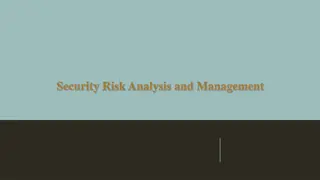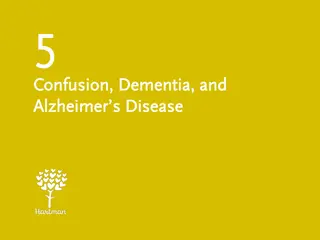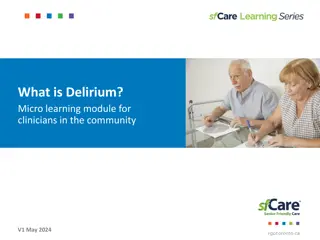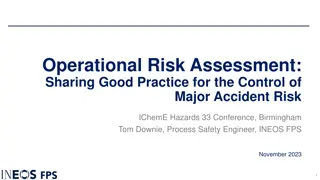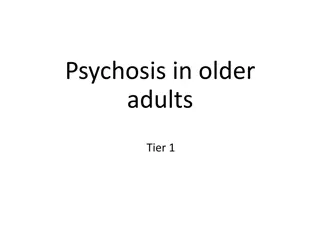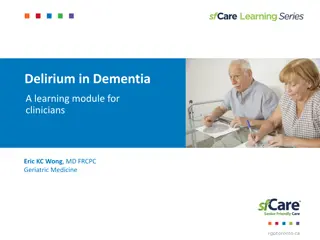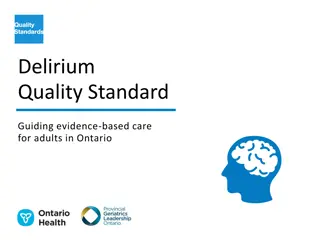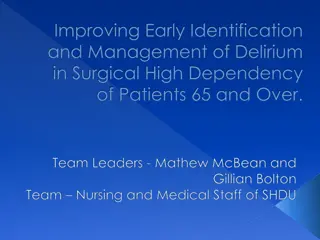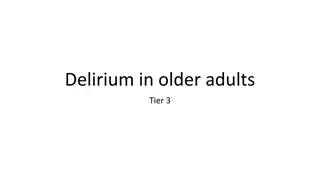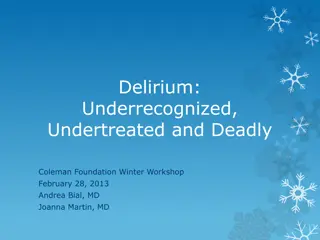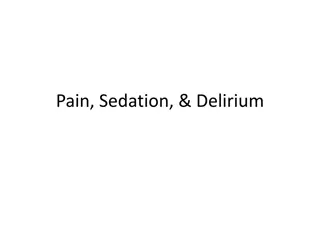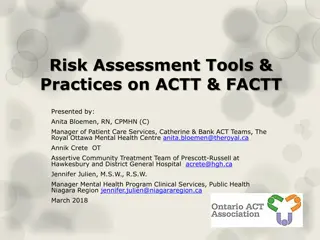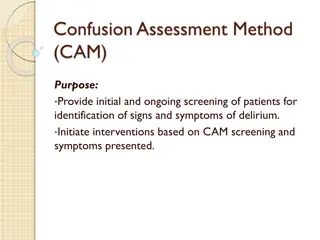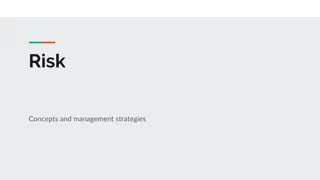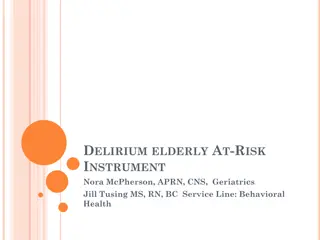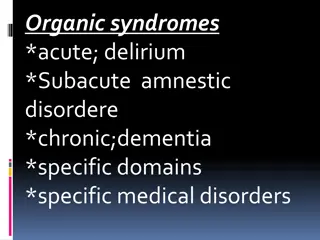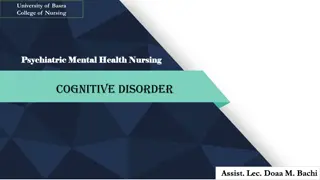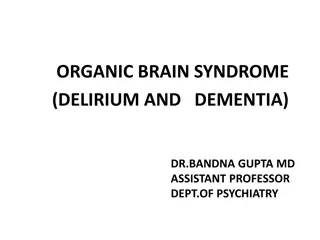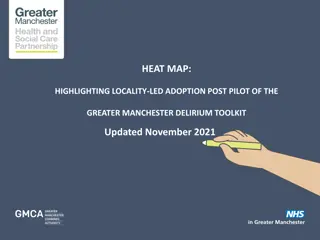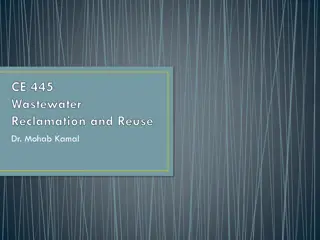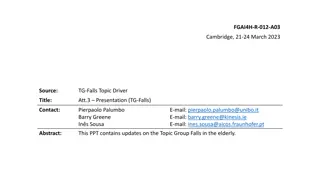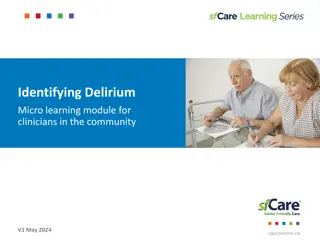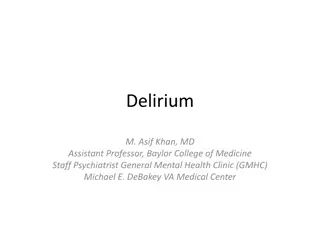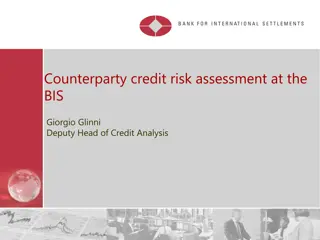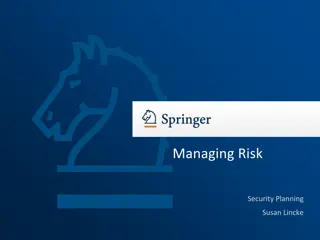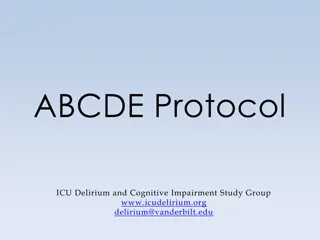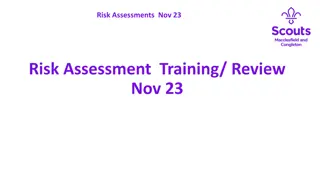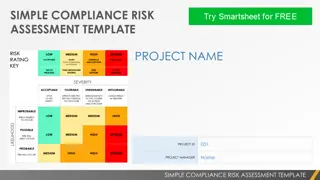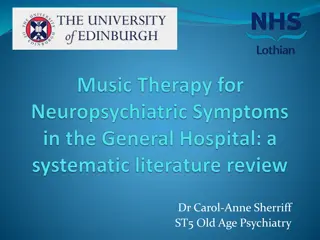Comprehensive ICU Protocol for Sedation, Analgesia, and Delirium Control by Dr. Vinod Srivastava
This comprehensive ICU protocol by Dr. Vinod Srivastava, an Associate Professor in Anaesthesiology & Critical Care at KGMU, covers key aspects such as sedation, analgesia, delirium assessment and control, stress ulcer and deep vein thrombosis prophylaxis, and glycaemic control in the ICU setting. Th
3 views • 50 slides
Comprehensive Overview of Security Risk Analysis and Management
Explore the essential aspects of security risk analysis and management, including risk identification, assessment, and control techniques within an Information Security (InfoSec) context. Learn about the purpose of risk management, steps involved in a risk management plan, asset identification and c
0 views • 22 slides
Risk Management in Environmental Geography and Disaster Management
Risk management in environmental geography and disaster management involves assessing the potential losses from hazards, evaluating vulnerability and exposure, and implementing strategies to mitigate risks. It includes calculating risk, dealing with risk through acceptance, avoidance, reduction, or
2 views • 10 slides
Introduction to Flood Risk Assessment with HEC-FDA Overview
This presentation delves into flood risk assessment using HEC-FDA software, covering topics such as defining flood risk, components of uncertainty, consequences of flood risk, and methods to assess flood risk including hydrology, hydraulics, geotechnical, and economics. It explores the intersection
7 views • 39 slides
Confusion, Dementia, and Delirium in Healthcare
This content discusses confusion, dementia, and delirium in relation to Alzheimer's disease, covering definitions, causes, and caregiving tips. Confusion is the inability to think logically, while delirium is a sudden state of severe confusion. Causes include infections, medications, and lack of sle
0 views • 53 slides
Delirium: A Micro Learning Module for Clinicians
Delirium is a sudden change in an individual's memory, thinking, and behavior, which requires urgent medical attention. Often misdiagnosed, it can be mistaken for other conditions like depression or dementia. Knowing the signs and symptoms, such as fluctuating confusion, difficulty focusing, and cha
2 views • 9 slides
Overview of DSW End Point Assessment Team Leader Level 3
DSW End Point Assessment Team Leader Level 3 provides a clear understanding of the assessment process, ensuring individuals comprehend why and when it occurs, responsibilities involved, and how DSW supports them. It covers topics such as what End Point Assessment entails, assessment design and deliv
2 views • 18 slides
Operational Risk Assessment for Major Accident Control: Insights from IChemE Hazards 33 Conference
This content provides valuable insights into the importance of Operational Risk Assessment (ORA) in managing major accident risks in high hazard industries. It covers the necessity of ORA, identifying changes, risk assessment, and key success factors. Real-life examples like the Buncefield Terminal
1 views • 22 slides
Psychosis in Older Adults
Psychosis in older adults involves a loss of contact with reality, including hallucinations and delusions. Symptoms vary but can include disordered thoughts, behaviors, and negative symptoms. It is common in older adults and can have various causes, such as delirium, mood disorders, dementia, and su
0 views • 10 slides
Project Risk Management Fundamentals: A Comprehensive Overview
Project risk management involves minimizing potential risks and maximizing opportunities through processes such as risk management planning, risk identification, qualitative and quantitative risk analysis, risk response planning, and risk monitoring and control. Quantitative risk analysis assesses t
0 views • 41 slides
Delirium in Dementia for Clinicians
This learning module provides clinicians with insights into the relationship between delirium and dementia, how to distinguish between the two conditions, practical approaches to assessing delirium in dementia patients, treatment implications, and a structured method for delirium detection using cas
0 views • 29 slides
Comprehensive Overview of Information Security Risk Assessment
Explore the agenda, strategies, frameworks, and resources related to effectively assessing information security gaps and risks in this detailed session. Learn about information risk, risk assessment goals, CIS resources, and the Duty of Care Risk Analysis Standard (DoCRA). Discover the importance of
0 views • 26 slides
Delirium Quality Standard in Ontario: Improving Evidence-Based Care
Delirium quality standards in Ontario aim to guide evidence-based care for adults by addressing gaps and variations in care quality. These standards inform clinicians, patients, and organizations on what quality care looks like, incorporating the best available evidence to ensure consistent, high-qu
0 views • 39 slides
Pennsylvania Risk Assessment: A Comprehensive Overview
This document explores the Pennsylvania risk assessment process, focusing on factors, techniques, and writing effective summaries. It covers learning objectives, agenda details, and the Pennsylvania Model Risk Assessment Form. Key points include understanding risk factors, making objective judgments
2 views • 8 slides
Enhancing Delirium Management in Surgical High Dependency Patients 65 and Over
Improving early identification and management of delirium in surgical high dependency unit (SHDU) patients aged 65 and over led by Mathew McBean and Gillian Bolton. Data collection, education initiatives, and pharmacological management guidelines were implemented, resulting in increased staff confid
0 views • 5 slides
Delirium in Older Adults: Types, Causes, and Symptoms
Delirium in older adults is a complex syndrome characterized by disturbances in consciousness, attention, perception, thinking, memory, and behavior. It commonly presents as hyperactive, hypoactive, or mixed types and can be caused by various factors such as medication, infections, metabolic imbalan
0 views • 17 slides
Delirium and Dementia: Key Differences and Recognition
Delirium and dementia are distinct conditions with specific diagnostic criteria. Delirium involves acute changes in attention and cognition, often due to underlying medical issues. Differentiating delirium from dementia and mild cognitive impairment is crucial. Recognizing delirium's rapid onset, fl
0 views • 34 slides
Delirium: Underrecognized, Undertreated, and Deadly Workshop Insights
Delirium is a serious condition frequently seen in advanced illness and palliative care settings. It is often underrecognized and undertreated, leading to detrimental outcomes such as increased mortality and healthcare costs. Understanding the symptoms, prevalence, outcomes, and impact of delirium i
0 views • 54 slides
Pain, Sedation, & Delirium Management in Critical Care
Effective management of pain, sedation, and delirium is essential in critical care settings to optimize patient comfort, facilitate recovery, and ensure better outcomes. The goal is to control pain adequately, minimize sedative use, and address indications for analgesia and sedatives while being min
0 views • 23 slides
Risk Assessment Tools and Practices in Community Mental Health Care
In March 2018, Anita Bloemen, Annik Crete, and Jennifer Julien presented insights on risk assessment practices in Assertive Community Treatment Teams. The focus was on enhancing frontline staff's comfort and confidence in delivering care outside hospital settings, emphasizing the need for ongoing aw
0 views • 32 slides
Comprehensive Overview of Confusion Assessment Method (CAM) for Delirium Screening
Confusion Assessment Method (CAM) is a crucial tool used for screening delirium in patients, particularly those aged 65 and older or presenting with acute confusion. CAM assesses for clinical features like acute onset, fluctuating course, inattention, disorganized thinking, and altered level of cons
0 views • 15 slides
Risk Concepts and Management Strategies in Finance
Explore the essential concepts of risk in finance, such as risk definition, risk profiles, financial exposure, and types of financial risks. Learn about risk vs. reward trade-offs, identifying risk profiles, and tools to control financial risk. Understand the balance between risk and return, and the
0 views • 18 slides
Risk and Return Assessment in Financial Management
This comprehensive presentation explores the intricacies of risk and return assessment in the realm of financial management. Delve into understanding risk concepts, measuring risk and return, major risk categories, and the impact of risk aversion on investment decisions. Gain insights into the manag
1 views • 62 slides
Risk Management & MPTF Portfolio Analysis at Programme Level for UN Somalia
This session delves into the world of risk management and portfolio analysis at the programme/project level, specifically focusing on the Risk Management Unit of the United Nations Somalia. It covers enterprise risk management standards, planned risk management actions, the role of RMU, joint risk m
0 views • 30 slides
Delirium Risk Assessment Tool for Elderly Patients
Assessing the risk of post-operative delirium in elderly patients is crucial for improving outcomes and reducing complications. The Delirium Elderly At-Risk (DEAR) instrument is a valuable tool that evaluates multiple domains including age, sensory impairment, functional dependence, substance use, a
0 views • 23 slides
Organic Syndromes: Delirium, Subacute Amnestic Disorder, and Chronic Dementia
Explore the spectrum of organic syndromes including delirium, subacute amnestic disorder, and chronic dementia. Delve into the definitions, statistics, causes, management strategies, classifications, and reversible dementias associated with these conditions.
0 views • 13 slides
Cognitive Disorders in Psychiatry: A Comprehensive Overview
Cognitive disorders disrupt higher brain functions, impacting memory, attention, and decision-making abilities. This article explores the classification of cognitive disorders, focusing on delirium, a common syndrome characterized by consciousness disturbance and cognitive changes. Delirium predomin
0 views • 26 slides
Organic Brain Syndrome & Delirium
Overview of organic brain syndrome and delirium, including definitions, clinical features, and management. Delirium, a common psychiatric syndrome, affects consciousness, cognition, and perception, leading to increased morbidity and mortality. Recognize core symptoms, such as disturbances in conscio
0 views • 37 slides
Locality-Led Adoption Post Pilot of the Greater Manchester Delirium Toolkit
Highlighting the successful pilot of the Greater Manchester Community Delirium Toolkit led by local teams in various regions. The toolkit aimed to standardize screening, assessment, and management of delirium, resulting in improved quality of care, proactive follow-up, timely treatment, education fo
0 views • 17 slides
Risk Analysis in Environmental Management: A Comprehensive Overview
Risk analysis plays a crucial role in environmental management, particularly in assessing potential health hazards and managing associated risks. This process involves risk assessment and risk management, with steps such as hazard identification, exposure assessment, dose-response assessment, and ri
0 views • 27 slides
Advances in Fall Risk Assessment and Management for Older Adults
This presentation delves into updates on the stratification tool for fall risk in community-dwelling older adults, emphasizing the importance of early intervention through opportunistic health visits. It discusses a decision tree model for assessing fall risk, highlighting the significance of histor
1 views • 12 slides
Delirium: Differentiating It from Dementia in Community Clinics
Learn how to differentiate delirium from dementia in community clinic settings with this micro-learning module. Delirium is often misdiagnosed but has key features such as sudden changes in cognition, fluctuating symptoms, and altered alertness levels. Discover practical assessment approaches and ca
0 views • 7 slides
Delirium: Diagnosis, Management, and Implications
Delirium, a common yet often misdiagnosed condition, is a disturbance of consciousness with acute onset and fluctuating symptoms. Learn about its impact, diagnostic criteria, and management strategies in clinical settings to improve patient outcomes.
0 views • 37 slides
Counterparty Credit Risk Assessment at the BIS: Approaches and Factors to Consider
The presentation discusses various approaches for assessing counterparty credit risk at the BIS, including full reliance on external ratings, internal risk assessment, and combinations of both. Factors such as credit risk exposures, regulatory requirements, organizational impact, skillset availabili
1 views • 36 slides
Developing a Risk Appetite Culture: Importance and Framework
Risk management plays a critical role in the success of corporations, with strategy and risk being intertwined. This presentation delves into definitions of key terms such as risk appetite, the Risk Appetite Cycle, characteristics of a well-defined risk appetite, and the importance of expressing ris
0 views • 31 slides
Security Planning and Risk Management Overview
This content provides an in-depth exploration of managing risk, security planning, and risk appetite in the context of cybersecurity. It covers essential concepts such as risk management process, threat types, risk analysis strategies, vulnerability assessment, and risk mitigation techniques. The ma
1 views • 73 slides
ABCDE Protocol and MIND-USA: Enhancing Critical Care Practices
Explore the importance of the ABCDE Protocol in managing ICU patients, focusing on sedation, analgesia, and the prevention of delirium. Learn about the potential drawbacks of sedative therapies and the need for coordinated care in critical care settings. Discover the MIND-USA ABCDE Protocol, emphasi
0 views • 43 slides
Comprehensive Risk Assessment Training Overview
In this risk assessment training session held on November 23, participants reviewed the process of writing and reviewing risk assessments to enhance the quality of assessments for safer scouting experiences. The training aimed to improve leaders' skills and confidence in risk assessment practices wh
0 views • 37 slides
Compliance Risk Assessment Template Project Report
This project report presents a simple compliance risk assessment template along with post-mitigation judgment, risk severity, risk level, mitigations, warnings, and remedies. It includes information on communication controls, risk severity levels, acceptability judgments, likelihood assessments, and
0 views • 5 slides
Music Therapy for Dementia and Delirium in General Hospitals: A Narrative Review
This study aimed to investigate the potential of music therapy in reducing neuropsychiatric symptoms in patients with dementia and delirium in general hospital settings. However, after a systematic literature review, no published evidence supporting the efficacy of music therapy for these conditions
0 views • 11 slides

